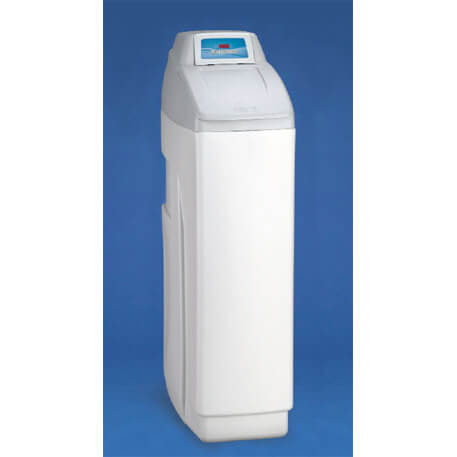Description
The Vertex WS-1035CSE Water Softening Systems is a compact All-in-One whole house residential water conditioning treatment system.
Vertex WS-1035CSE All-In-One Water Softener - Stylish and compact, the WS-1035CSE water softener is enclosed in one cabinet saving valuable space. Our Compact Water Conditioner is perfect for small areas with limited space. Hardness Removal - 30,000 grains.
Hard water is any water supply that contains excess minerals or metals, such as calcium and iron. Although hard water is generally safe to use, it can cause a variety of problems related to cleaning and appliance use. Water softeners remove or dilute the mineral concentrations in hard water and offer several benefits to homeowners.
Benefits of Water Softeners and Water Conditioners
Easier Cleaning - Clothes and dishes washed in hard water may end up with white spots, streaks, and soapy residue. Water softening helps rinse soap residue more thoroughly, leaving your clothing and dishes as well as your hair and skin looking and feeling cleaner. Soft water also reduces the amount of soap or detergent you need for cleaning, which helps to lower expenses for these products. With less soap scum and film left behind, you may also find that bathtubs, showers and sinks stay cleaner and are easier to maintain after you install a water softener.
Extended Appliance Life - The minerals found in hard water can build up on the insides of appliances, shortening their usable life and decreasing overall efficiency. According to North Dakota State University, water-softening systems extend the life of washing machines, dishwashers, water heaters and other appliances that use water. If your appliances last longer, you'll save money by replacing these items less frequently. Longer appliance lifespans also benefit the environment by reducing waste and conserving the raw materials and energy used in manufacturing.
Faster Water Heating - Hot water heaters can heat softened water more quickly than hard water. The Virginia Cooperative Extension estimates that water softeners improve efficiency by 22 percent for electric water heaters and 29 percent for gas-powered units. Improved efficiency reduces energy consumption, resulting in lower utility bills.
Cleaner Plumbing System - Hard water leaves scaly deposits in plumbing fixtures and pipes. As these deposits build up over time, they cause clogs and corrosion that can shorten the life of your home's plumbing system. By reducing mineral deposits, water softening systems minimize buildup and reduce the risks of clogs and corrosion, extending the life of the plumbing system and helping fixtures operate more effectively. For instance, if you have hard water, your shower heads can become so clogged that they are virtually useless in less than 2 years, according to the Water Quality Association.
Choosing the Correct Capacity Water Softener
To choose the softener with the correct capacity, water usage and water hardness must be determined. Water usage can be obtained from a water bill, or use the estimated 100 gallons per person per day average for most US citizens. Water hardness information can often be obtained from the local water company. Water should be tested in a well water system, or when the local municipal water information is unavailable. Example - An average family uses 100 gal./day of water per person. A household of four needs 400 gal/day of softened water. If the water has a hardness of 20 grains per gallon, 8000 grains have to be removed per day (400 gal. X 20 grains/gal.) With regeneration every 3-days, the minimum softener capacity should be 24,000 grains (8000 grains/day x 3 days). A 1.0 cu. Ft. softener model can remove 30,000 grains and would be the right choice. Hardness conversion - Hardness is measured in grains per gallon (GPG). Most often the published municipal water information is in part per million (PPM).
Determine the GPG by using the equation: PPM ÷ 17 = Grains per Gallon (GPG)Water Softening is a 4-Step Process
- The water softener tank is filled with small diameter resin beads which are covered with sodium ions. When hard water flows through the resin bed, the beads act like a magnet, attracting the calcium and magnesium ions in the water in exchange for the sodium ions.
- Eventually the resin beads become saturated with the hardness mineral ions and must be "re-charged". This regeneration process is conducted by the control valve on the top of the tank. The control valve is the brain of the system.
- During regeneration, a strong brine solution from the brine tank is flushed through the resin tank, bathing the resin beads in a stream of sodium ions from the salt in the brine. This replaces the calcium and magnesium ions captured by the resin beads.
- The brine solution carrying the displaced hardness minerals is flushed to the drain with fresh water. The resin beads can be used over again.
Benefits of a Vertex WS-1035CSE Water Softener
- Ion exchange for hadness mineral removal
- Uses Purolite 40-70 mesh resin for low salt use and minimum brine discharge
- Metered demand regeneration meets California requirements
- Proven Fleck Valve provides reliable control - Digital metered control valve uses a solid state microprocessor with LED display.
Specifications
Specifications of the Vertex WS-1035CSE Water Softener
| Application | Limited space areas or places where an All-in-One cabinet is desired. |
| Nominal Resin Capacity | 1.0 Cu. Ft. |
| Nominal System Flow | @50 psi, 15 psig drop - 9.5 gpm |
| Hardness Removal | 30,000 Grains |
| Control Valve Type | Fleck 5600SE |
| Power Supply | 24VAC Includes Transformer |
| Pipe Sizes | Inlet - 3/4" or 1" | Drain 1/2" |
| Fittings | Noryl Yoke |
| Weight | 85 lbs. |
| Overall Dimensions | 45" H x 12' W x 21" D |









